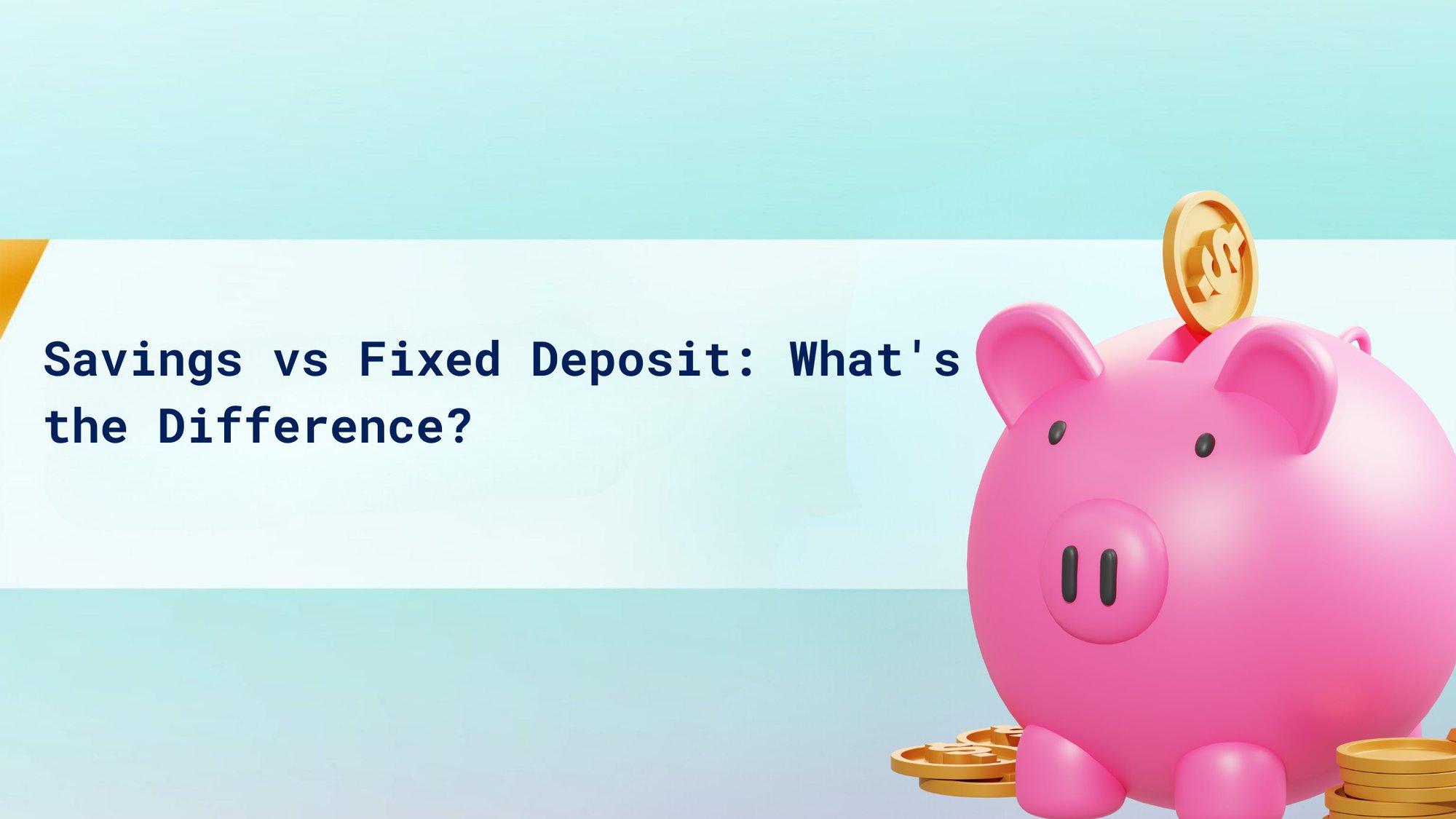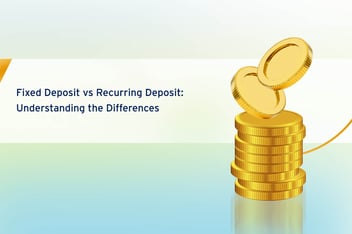
Savings vs Fixed Deposits: What’s the Difference?
Author Taiwo Temitope-Adesope
Savings accounts and fixed deposits are both common financial instruments that individuals use to save and grow their money. Each option has its advantages and disadvantages, and the choice between savings vs fixed deposits depends on your financial goals, risk tolerance, and liquidity needs.
Choosing Between a Savings vs Fixed Deposit Account
Before choosing between a savings account and a fixed deposit account, there are several important factors to consider.
Here are some key things to note:
● Financial Goals
Identify your financial goals and the purpose of the funds. If you need quick access to your money for emergencies or short-term expenses, a savings account may be more suitable.
If you have a medium to long-term goal and can afford to lock in your funds, a fixed deposit might provide higher interest rates.
● Time Horizon
Consider your time horizon for the investment. If you anticipate needing the funds soon or if your financial situation is subject to change, a savings account with easy accessibility may be more appropriate.
Fixed Deposits are better suited for medium to long-term goals due to their fixed maturity periods.
● Liquidity Needs
Assess your liquidity needs. Savings accounts offer high liquidity, allowing you to withdraw funds at any time without penalties. Fixed deposits, on the other hand, have restrictions on early withdrawals, and doing so may result in loss of interest and penalty charges.
● Interest Rates
Compare the interest rates offered by savings accounts and fixed deposits. Fixed deposits typically offer higher interest rates, especially for longer terms. However, consider whether the higher interest justifies the trade-off in liquidity.
● Penalties for Early Withdrawal
Understand the penalties associated with early withdrawal for fixed deposits. If there's a chance you might need to access your funds before the maturity date, be aware of the potential costs and restrictions.
● Inflation Consideration
Consider the impact of inflation on the real value of your returns. While fixed deposits provide a guaranteed return, the interest rates may not always keep pace with inflation. Inflation can erode the purchasing power of your money over time.
● Risk Tolerance
Assess your risk tolerance. Savings accounts are generally low-risk and provide easy access to funds, making them suitable for individuals with lower risk tolerance. Fixed deposits also carry low risk but may involve tying up funds for a specific period.
● Diversification
Some individuals choose to diversify their savings by having a combination of both savings accounts and fixed deposits. This approach provides a balance between liquidity and higher returns.
● Bank Reputation
Choose a reputable bank or financial institution. Ensure that the institution is regulated and insured, especially for savings accounts. This protects your deposits.
● Tax Implications
Understand the tax implications of interest earnings on both savings accounts and fixed deposits. Interest income may be subject to taxes, and the treatment can vary based on local regulations.
Carefully evaluating these factors will help you make an informed decision based on your unique financial situation, goals, and preferences. Additionally, consider consulting with a financial advisor for personalized advice tailored to your specific needs.
Reasons Why Fixed Deposits Are a Good Investment Option
While the suitability of investment options depends on individual financial goals, risk tolerance, and time horizons, fixed deposits (FDs) are often considered a favourable investment choice for several reasons.
Here are some reasons why fixed deposits are the preferred investment option.
● Safety and Low Risk
Fixed deposits are considered low-risk investments, especially when compared to more volatile options like stocks or mutual funds. The principal amount is typically secured, and interest rates are predetermined, offering a predictable return.
● Guaranteed Returns
Fixed deposits provide guaranteed returns as the interest rate is fixed at the time of investment. This makes it easier for investors to plan and project their future earnings.
● Stable and Predictable Income
Investors looking for a stable and predictable source of income often opt for fixed deposits. The interest earned can be a steady source of income, making it particularly appealing for retirees or those seeking regular payouts.
● Ease of Understanding
Fixed deposits are easy to understand. The terms, interest rates, and maturity periods are typically transparent, making it an accessible investment option for individuals who may be new to investing.
● Flexibility in Tenure
Fixed deposits come with various tenure options, allowing investors to choose a period that aligns with their financial goals. Tenures can range from a few months to several years, offering flexibility in terms of investment horizon.
● Liquidity with Premature Withdrawal
While fixed deposits have a fixed tenure, many banks offer the option of premature withdrawal in case of urgent liquidity needs. However, this may be subject to penalties or a reduction in interest rates.
● Diversification of Portfolio
Fixed deposits can serve as a valuable component of a diversified investment portfolio. While they may not offer the potential for high returns like some riskier investments, their stability can contribute to overall portfolio balance.
● Tax Benefits
Certain fixed deposits may qualify for tax benefits, either in the form of deductions or exemptions on the interest income. Investors should be aware of the tax implications and consult with tax professionals.
● Capital Preservation
The principal amount invested in fixed deposits is generally secure, ensuring capital preservation. This makes fixed deposits an attractive option for conservative investors who prioritize the safety of their capital.
● Automatic Renewal Options
Many banks offer automatic renewal options for fixed deposits. This means that upon maturity, the principal amount along with the interest can be reinvested for another term, providing a seamless continuation of the investment.
● No Market Volatility
Unlike investments in the stock market, fixed deposits are not influenced by market fluctuations. This stability can be reassuring for investors who prefer to avoid the uncertainties associated with market volatility.
While fixed deposits offer several advantages, it's essential to note that they may not provide the highest returns compared to riskier investment options.
Why Savings Accounts Are Considered a Good Option
Savings accounts are often considered a safe and accessible option for individuals looking to park their money while earning some interest.
Here are several reasons why savings accounts can be considered a good investment option for certain financial goals:
● Liquidity and Accessibility
Savings accounts provide high liquidity, allowing account holders to access their funds easily. This makes savings accounts suitable for emergency funds and short-term financial needs.
● Safety and Security
Savings accounts are considered low-risk and are usually insured up to a certain limit by government-backed deposit insurance schemes. This provides a level of safety and security for the deposited funds.
● Stability and Predictability
The interest rates on savings accounts are generally stable and predictable. While they may not offer the highest returns, the stability can be advantageous for individuals who prioritize the preservation of their capital.
● No Market Risk
Unlike investments in stocks or mutual funds, savings accounts do not expose investors to market risk. The interest earned is not subject to market fluctuations, providing a level of certainty.
● Ease of Use
Savings accounts are easy to open and manage. They are suitable for individuals who prefer a straightforward financial instrument without the complexities often associated with other investment options.
● No Lock-In Period
Unlike fixed deposits which have fixed tenures, savings accounts do not have a lock-in period. Account holders can withdraw their funds whenever needed without penalties.
● Automatic Transfers and Standing Orders
Many savings accounts offer features like automatic transfers and standing orders, allowing individuals to automate savings and ensure a consistent contribution to their savings goals.
● Variety of Account Types
Banks often offer different types of savings accounts to cater to various needs. This includes regular savings accounts, high-yield savings accounts, and specialized accounts with specific features such as joint accounts or accounts for minors.
● Emergency Fund
Savings accounts are commonly used as a home for emergency funds. The accessibility of funds in a savings account ensures that individuals can quickly respond to unexpected expenses without resorting to high-interest debt.
● Education and Financial Literacy
For individuals new to financial planning and investing, savings accounts can serve as a practical introduction to the world of personal finance. They offer a straightforward way to start saving and learning about money management.
● No Market Timing
Some investment options may require strategic timing for buying or selling. Savings accounts however do not involve market timing. Account holders can deposit or withdraw funds at any time without concerns about market conditions.
● No Investment Knowledge Required
Savings accounts do not require specialised investment knowledge. They are accessible to individuals with varying levels of financial literacy, making them an inclusive option for a wide range of people.
Ultimately, the choice between a savings account and a fixed deposit depends on individual financial goals, risk tolerance, and time horizons.
Diversification of investments across various asset classes is often recommended for a well-balanced financial strategy.
Don’t forget to visit nairaCompare for information on savings accounts, fixed deposits, interest rates and more.
About Author

Taiwo Temitope-Adesope
Taiwo is a passionate storyteller and strategist dedicated to empowering women and crafting compelling narratives. A First-Class graduate in Mass Communication from Covenant University, she specializes in writing, public relations, and digital marketing. As a Content Manager at Suretree, she drove a 50% increase in web traffic through SEO and boosted website engagement by 60% in just four months. Her leadership experience includes serving as Public Relations Officer for the Covenant University Student Council and contributing to impactful volunteer initiatives. With expertise in strategic thinking and business acumen, Taiwo continues to create stories that inspire confidence and imagination.









